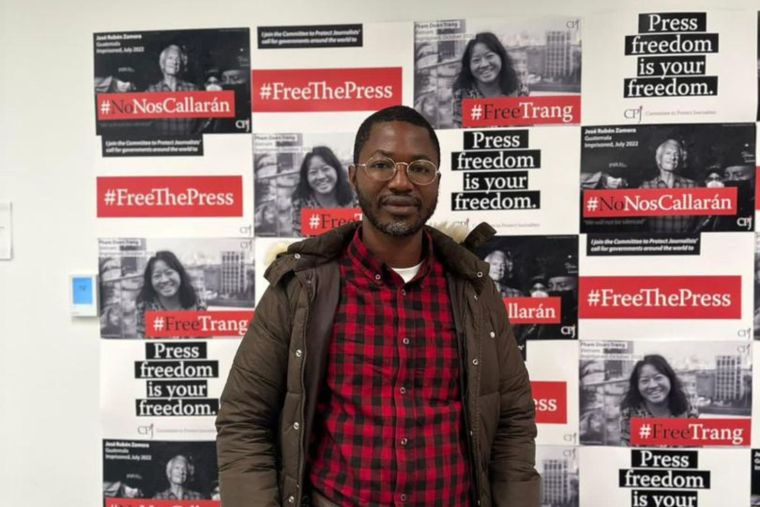Dakar, January 31, 2024— Guinean authorities should immediately reverse the suspension of Dépêche Guinée and the privately owned news website’s publishing director, Abdoul Latif Diallo, ensure journalists are not expelled or arrested over critical coverage, and ensure unhindered access to social media platforms, news sites, and broadcasters, the Committee to Protect Journalists said Wednesday.
“Guinean authorities should immediately roll back the wave of censorship efforts unleashed on the press in recent months, including the suspension or blocking of outlets, arrests of journalists, and repression of those who stand up for press freedom,” said Angela Quintal, CPJ’s Africa program coordinator, from New York. “The suspension orders against the Dépêche Guinée website and publishing director Abdoul Latif Diallo should be reversed, and all other restrictions on the various blocked outlets and online platforms should be lifted.”
On January 17, Guinea’s media regulator, the High Authority of Communication (HAC), suspended Dépêche Guinée for nine months, and Diallo for six months, according to a copy of the regulator’s decision and Diallo, who spoke to CPJ. During his suspension, Diallo “cannot create or provide his services to a news organization,” according to the order.
The suspension order, which followed complaints from Guinea’s Minister of Economy and Finance, Moussa Cissé, and the governor of the country’s central bank, Karamo Kaba, cited a “lack of cross-checking” in Diallo’s January 15 report about the alleged embezzlement of public funds.
The order also accused Diallo of being a recidivist defamer. In September 2023, HAC had previously suspended Diallo and his news outlet for failing to adequately “verify” and “cross-check” information in an August 20 report he wrote.
Separately, on January 14, Guinean authorities deported French freelance journalist Thomas Dietrich, alleging that he had entered the country illegally, according to the journalist, who spoke to CPJ, and media reports. Dietrich, who was investigating embezzlement at the national oil company, told CPJ he had entered the country with a visa and was not given any written explanation for his expulsion. Police officers arrested him later that day at his hotel in the capital, Conakry, took him to the judicial police headquarters, seized his phones and computer, and then questioned him about their contents, Dietrich said, adding that the officers returned his phones but kept his computer.
Earlier in the month, on January 3, the privately owned news site Mosaïque Guinée became inaccessible from within Guinea without any notice of an official decision to block it, Mosaïque Guinée publishing director Mohamed Bangoura told CPJ. Bangoura said that readers could only access the site’s content with a virtual private network (VPN), severely reducing the outlet’s audience and advertising-based revenue.
Reached over the phone, Guinea’s government spokesman and Minister of Post, Telecommunications, and Digital Economy, Ousmane Gaoual Diallo, did not directly confirm the cause of the Mosaïque Guinée’s blocking, but suggested that Bangoura was aware of what had caused it.

Bangoura told CPJ that Gaoual Diallo and HAC president Boubacar Yacine Diallo called him on December 22, 2023, to ask that he take offline an article about an internal army communication, which Bangoura said he subsequently took down.
Gaoual Diallo confirmed to CPJ having made this call, but did not confirm a connection with the website’s blocking in January. In response to CPJ’s questions about online censorship more broadly, including the blocking late last year of the news site Guinée Matin, Gaoual Diallo told CPJ that his office was not responsible for any website blocks. Such actions were the responsibility of other “public structures,” he said, without elaborating.
CPJ called Yacine Diallo but received no response.
Since late 2023, major social media platforms, including Facebook, YouTube, WhatsApp, Instagram, and Twitter, have remained blocked in Guinea, as well as the TV and radio broadcasts of Espace, Evasion, Djoma, and Fim, according to N’Faly Guilavogui, deputy director of the Evasion media group, Diallo, and CPJ reporting.
Gaoual Diallo told CPJ that the blocking of social networks was a government response to the fact that those companies were benefiting from state infrastructure without paying for it and that the government was preparing unspecified regulatory reforms.
Meanwhile, on January 18, authorities in the capital arrested nine journalists as they covered a protest by members of the Syndicate of Press Professionals of Guinea (SPPG) against media censorship, before releasing them later that day and dismissing the case the following day, according to media reports.
On January 19, authorities in Conakry also arrested Sékou Jamal Pendessa, secretary general of the SPPG, according to Abdoulaye Cissé, the union’s head of communication, and news reports. On January 22, they charged him with participating in an unauthorized demonstration and publication of data likely to disturb public order over his participation in the protest. As of January 31, Pendessa remained in detention.
